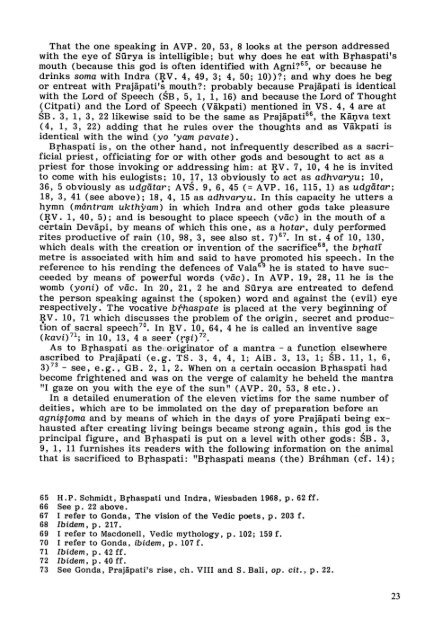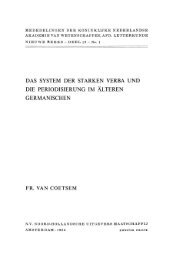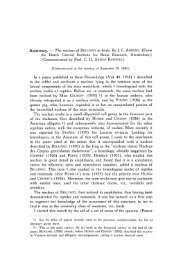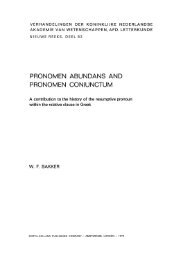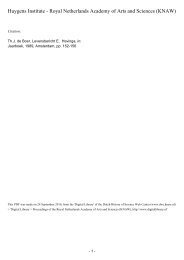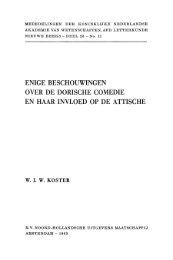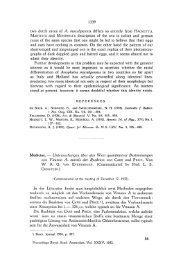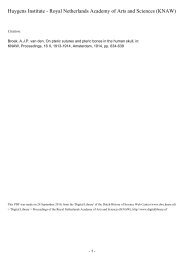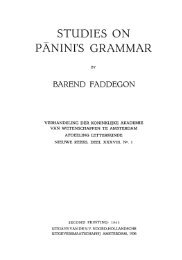Prajapati's relations with Brahman, Brhaspati and Brahma - DWC
Prajapati's relations with Brahman, Brhaspati and Brahma - DWC
Prajapati's relations with Brahman, Brhaspati and Brahma - DWC
You also want an ePaper? Increase the reach of your titles
YUMPU automatically turns print PDFs into web optimized ePapers that Google loves.
That the one speaking in AVP. 20, 53, 8 looks at the person addressed<br />
<strong>with</strong> the eye of Sürya is intelligible; but why does he eat <strong>with</strong> <strong>Brhaspati</strong>'s<br />
mouth (because this god is of ten identified <strong>with</strong> Agni?6s, or because he<br />
drinks soma <strong>with</strong> Indra (RV. 4, 49, 3; 4,50; 10))?; <strong>and</strong> why does he beg<br />
or entreat <strong>with</strong> Prajäpati's mouth?: probably because Prajäpati is identical<br />
<strong>with</strong> the Lord of Speech (:~m, 5, 1, 1, 16) <strong>and</strong> because the Lord of Thought<br />
~ Citpati) <strong>and</strong> the Lord of Speech (Väkpati) mentioned in VS. 4, 4 are at<br />
SB. 3, 1, 3, 22 likewise said to be the same as Prajäpati 66 , the KäI}va text<br />
(4, 1, 3, 22) adding that he rules over the thoughts <strong>and</strong> as Väkpati is<br />
identical <strong>with</strong> the wind (yo 'yam pavate).<br />
<strong>Brhaspati</strong> is, on the other h<strong>and</strong>, not infrequently described as a sacrificial<br />
priest, officiating for or <strong>with</strong> other gods <strong>and</strong> besought to act as a<br />
priest for those invoking or addressing him: at IJV. 7, 10, 4 he is invited<br />
to come <strong>with</strong> his eulogists; 10, 17, 13 obviously to act as adhvaryu; 10,<br />
36,5 obviously as udgatar; AVS. 9, 6, 45 (= AVP. 16, 115, 1) as udgatar;<br />
18, 3, 41 (see above); 18, 4, 15 as adhvaryu. In this capacity he utters a<br />
hymn (mántram ukthyam) in which Indra <strong>and</strong> other gods take pleasure<br />
(IJV. 1, 40, 5); <strong>and</strong> is besought to place speech (vac) in the mouth of a<br />
certain Deväpi, by means of which this one, as a hotar, duly performed<br />
rites productive of rain (10, 98, 3, see also st. 7)67. In st. 4 of 10, 130,<br />
which deals <strong>with</strong> the creation or invention of the sacrificé 8 , the brhatï<br />
met re is associated <strong>with</strong> him <strong>and</strong> said to have promoted his speech. In the<br />
reference to his rending the defences of Vala 69 he is stated to have succeeded<br />
by means of powerful words (vac). In AVP. 19, 28, 11 he is the<br />
womb (yoni) of vac. In 20, 21, 2 he <strong>and</strong> Sürya are entreated to defend<br />
the person speaking against the (spoken) word <strong>and</strong> against the (evil) eye<br />
respectively. The vocative b(-haspate is placed at the very beginning of<br />
IJV. 10, 71 which discusses the problem of the origin, secret <strong>and</strong> production<br />
of sacral speech 70. In IJV. 10, 64, 4 he is called an inventive sage<br />
(kavi) 71; in 10, 13,4 a seer (rsi) 72.<br />
As to <strong>Brhaspati</strong> as the,',originator of a mantra - a functi0!l elsewhere<br />
ascribed to Prajäpati (e.g. TS. 3, 4, 4, 1; AiB. 3, 13, 1; SB. 11, 1, 6,<br />
3) 73 - see, e. g., GB. 2, 1, 2. When on a certain occasion <strong>Brhaspati</strong> had<br />
become frightened <strong>and</strong> was on the verge of calamity he beheld the mantra<br />
"I gaze on you <strong>with</strong> the eye of the sun" (AVP. 20, 53, 8 etc.).<br />
In a detailed enumeration of the eleven victims for the same number of<br />
deities , which are to be immolated on the day of preparation before an<br />
agni~toma <strong>and</strong> by means of which in the days of yore Prajäpati being exhausted<br />
after creating living beings became st rong again, this god,is the<br />
principal figure, <strong>and</strong> B rhaspati is put on a level <strong>with</strong> other gods: SB. 3,<br />
9, 1, 11 furnishes its readers <strong>with</strong> the following information on the animal<br />
that is sacrificed to <strong>Brhaspati</strong>: "<strong>Brhaspati</strong> means (the) Bráhman (cf. 14);<br />
65 H.P. Sehmidt, <strong>Brhaspati</strong> und Indra, Wiesbaden 1968, p. 62 ff.<br />
66 See p. 22 above.<br />
67 1 refer to Gonda, The vision of the Vedie poets, p. 203 f.<br />
68 Ibidem, p. 217.<br />
69 I refer to Maedonell, Vedie mythology, p. 102; 159 f.<br />
70 I refer to Gonda, ibidem, p. 107 f.<br />
71 Ibidem, p. 42 ff.<br />
72 Ibidem, p. 40 ff.<br />
73 See Gonda, Prajäpati's rise, eh. VIII <strong>and</strong> S. Bali, op. eit., p. 22.<br />
23


